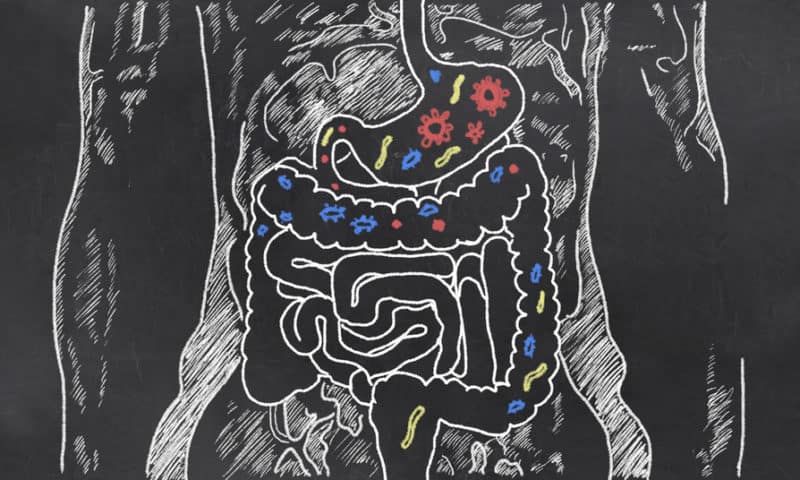Last Updated on April 9, 2021 by Ellen Christian
Last week I shared a few food-based tips that people with IBS or IBS-related symptoms can try to improve their symptoms naturally. This week, I wanted to continue the discussion by talking about supplements that have been shown to help people to feel better. Thank you again to HealthyCare.me for sponsoring this conversation.
Posts may be sponsored. This post contains affiliate links, which means I will make a commission at no extra cost to you should you click through and make a purchase. As an Amazon Associate I earn from qualifying purchases.
3 Supplement-based Tips to Treat IBS
IBS is a frustrating disease, causing a variety of different symptoms in different people. To make things even harder, a treatment that helps one person may not help someone else. A variety of food-based treatments have been shown to help IBS symptoms, and there are several supplements that have been found to be worth trying.
In repeated studies, probiotics, soluble fiber and peppermint oil supplementation have been shown to help decrease IBS related symptoms, like bloating, diarrhea, constipation, pain, and nausea. While these things may not completely eliminate your IBS symptoms, they may help. Overall they’ve been found to be very safe and generally affordable.
Probiotics
Probiotics are live bacteria or yeast organisms that play beneficial roles in health when taken in properly. They can be found in fermented foods like yogurt and kefir, human milk, and manufactured supplements.
There are several ways that the healthy bacteria in the colon can be disrupted; medications, certain foods, infections by unhealthy bacteria or viruses, and emotional stress can all play a role.
There are clinical studies showing probiotics can decrease bloating, constipation, and abdominal pain. Certain species of bacteria have more data suggesting their benefit than others, including Bifidobacterium, Lactobacillus, Streptococcus, and Saccharomyces species. Still, there are things that are not clear about the use of probiotics including, which type of bacteria or yeast is best, what dose is best for everyone, and how long they should be taken.
Probiotics are generally very safe, but people with conditions of weakened immune systems should consult with their physician before use. It’s also important to note that people who have worsening symptoms may have a condition of Small Intestinal Bacterial Overgrowth (SIBO) and should speak to their doctors.
Fiber
For years, fiber has been recommended to people suffering from IBS. Studies however show conflicting results as to whether fiber helps IBS. Recent studies have looked at specific types of fiber and suggest soluble fiber help IBS symptoms, whereas insoluble fiber may not.
Fiber as a whole are carbohydrates, or sugars, that are not able to be digested in the human gastrointestinal tract. Some fibers are “soluble” meaning they mix with water, while others are insoluble. This is important as soluble fibers seem to be more helpful for IBS symptoms. The data on taking insoluble fiber supplements isn’t as clear when it comes to IBS. There are some studies that actually show worsening symptoms. There are other fiber related factors to consider when increasing fiber intake. Some fibers are fermentable and are high in FODMAPS, which can worsen IBS symptoms in many people.
To start, keeping it simple and safe, psyllium is a soluble fiber supplement that has been shown to improve IBS symptoms, including diarrhea, constipation and abdominal pain.
Peppermint Oil
Peppermint has a long history of use for helping soothe upset stomachs and aid in digestion. Recently it has been shown to help IBS symptoms. Menthol and methyl salicylate are the primary ingredients in peppermint that help provide antispasmodic benefits to the gut by relaxing the smooth muscle lining the intestines.
Several studies show taking enteric coated capsules can help decrease abdominal pain, bloating and diarrhea associated with IBS. Taking a peppermint supplement with an enteric coating is important to decrease the peppermint oil from being released into the stomach and causing heartburn. Doses of 1-2 capsules [0.2cc of peppermint oil/capsule] 2-3 times per day can be tried.
Overall, peppermint oil is very safe, though certain precautions should be taken. Peppermint oil should be avoided if you have GERD-related heartburn and may worsen symptoms from gallstones. Please talk to your doctor before starting peppermint oil if you are pregnant, or take medications like cyclosporine, certain medications metabolized by the liver, or blood pressure medications.
Summary
To help with your IBS, probiotics, soluble fiber and peppermint oil are good options to try along with diet-based practices, mind-body therapies, and exercise. None of them work for everyone, but they have good data showing benefits for many people who have IBS and they are generally inexpensive and safe.
I hope these recommendations give you more ways to start addressing your IBS symptoms. Keep in mind though, that to see the most improvement in your symptoms, dietary changes are just one part of a comprehensive, multidisciplinary approach to treating IBS. Next week, I’ll share some ways to reduce stress to help with your IBS symptoms.
In the meantime, if you’d like to try guided, evidence-based online program to help you self-manage your IBS without the significant cost or inconvenience of ongoing office visits, please take a look at the free trial at HealthyCare.me. Everything most people need to feel better is available at your fingertips, including instructive video-based content, a community of peers with IBS, and a MD-led, integrative healthcare team to answer your questions.
AUTHOR: Dr. Ray Howe, MD

Ellen is a busy mom of a 24-year-old son and 29-year-old daughter. She owns six blogs and is addicted to social media. She believes that it doesn’t have to be difficult to lead a healthy life. She shares simple healthy living tips to show busy women how to lead fulfilling lives. If you’d like to work together, email info@confessionsofanover-workedmom.com to chat.


4 thoughts on “3 Supplement-based Tips to Treat IBS”